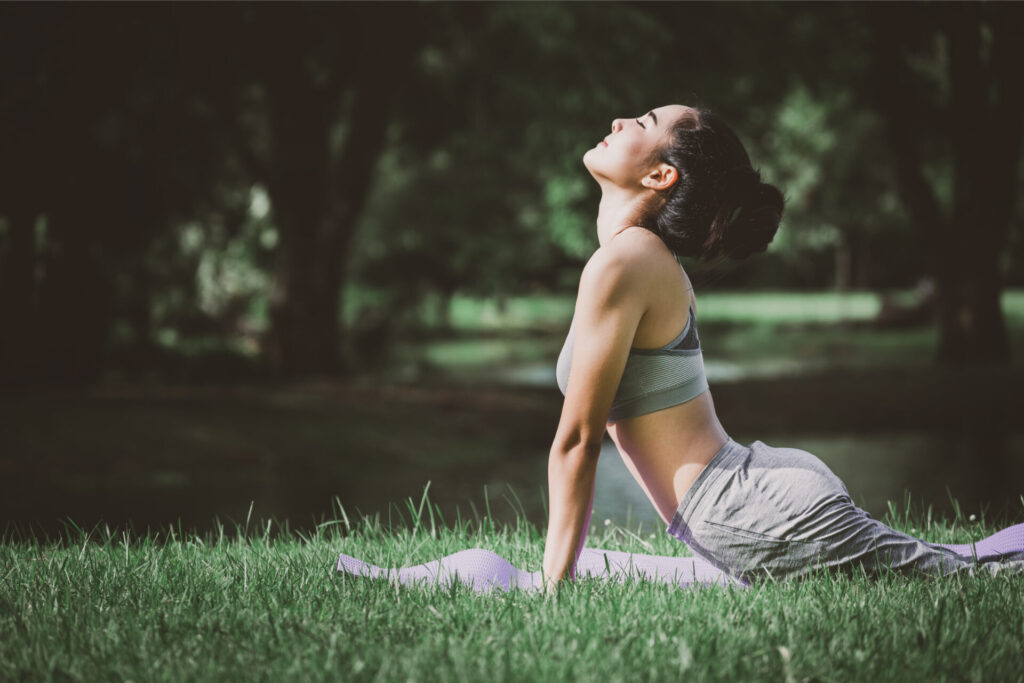
Addiction recovery is a challenging journey that requires a comprehensive approach to healing the mind, body, and spirit. One effective method that has gained popularity in recent years is incorporating yoga into addiction recovery programs. Yoga, an ancient practice that combines physical postures, breathing exercises, and meditation, offers numerous benefits for individuals in recovery.
At Lake Ave Recovery, our holistic rehab in Massachusetts can help you or a loved one find an alternate path to recovery. Call us now at 508-794-4400 or verify your insurance now.
The Benefits of Yoga for Addiction Recovery
Yoga offers numerous benefits that can significantly aid in addiction recovery, addressing physical, mental, emotional, and spiritual aspects. Some of those benefits can include:
- Physical Benefits: Yoga helps improve strength, flexibility, and overall physical health, which can be weakened by substance abuse. Certain yoga poses stimulate the organs and promote detoxification, helping cleanse the body of toxins. Additionally, yoga can alleviate chronic pain, a common issue for individuals recovering from addiction.
- Mental and Emotional Benefits: Yoga reduces stress and anxiety through relaxation techniques and breathing exercises. It helps individuals manage their emotions, reducing the risk of relapse. By promoting mindfulness, yoga allows individuals to focus on the present moment, developing a deeper awareness of their thoughts and feelings. This mindfulness helps let go of negative self-talk and self-criticism, fostering a more positive self-image. Yoga provides a safe space to explore difficult emotions, helping individuals heal from trauma, regulate their nervous system, and feel more grounded.
- Spiritual Benefits: Yoga fosters a sense of inner peace and contentment, crucial for long-term recovery. It helps individuals connect with their inner selves, finding purpose and meaning in their recovery journey. Regular practice encourages self-awareness, self-acceptance, and gratitude, helping individuals cultivate a sense of wholeness.
- Building a Sense of Community: Yoga classes provide a sense of community and belonging, essential in the recovery process. Attending yoga classes regularly helps individuals build relationships with others who share similar struggles and goals, combating the loneliness often associated with addiction recovery.
By integrating yoga into their addiction recovery journey, individuals can enhance their overall well-being and increase their chances of maintaining long-term sobriety.
How Yoga is Incorporated in Addiction Recovery
Incorporating yoga into addiction recovery programs involves several key components. Though it can vary by individual and resources available, some of those components can look like:
- Structured Classes: Many recovery centers offer structured yoga classes led by experienced instructors who understand the needs of individuals in recovery.
- Personalized Programs: Yoga programs can be tailored to meet the specific needs and physical capabilities of each individual, ensuring a safe and effective practice.
- Integration with Other Therapies: Yoga is often used alongside traditional therapies, such as counseling and medication-assisted treatment, to provide a holistic approach to recovery.
- Mindfulness and Meditation: Yoga classes often include mindfulness and meditation practices that help individuals develop coping strategies and enhance their overall well-being.
- Supportive Environment: Practicing yoga in a supportive group setting can foster a sense of community and belonging, which is essential for recovery.

How to Get Started with Yoga for Addiction Recovery
Starting a yoga practice as part of addiction recovery can be a rewarding and transformative experience. Here are some essential steps to help you integrate yoga into your recovery journey:
Find a Qualified Instructor
Look for a yoga instructor experienced in addiction recovery who can guide you through a safe and effective practice. A knowledgeable instructor will help you tailor your practice to meet your specific needs and ensure a supportive environment.
Choose the Right Class
Begin with beginner-friendly classes that focus on gentle movements, relaxation techniques, and the mind-body connection. Classes emphasizing mindfulness and breathwork are particularly beneficial for individuals in recovery, providing a nurturing environment that encourages self-compassion and personal growth.
Establish a Routine
Consistency is key to reaping the benefits of yoga. Incorporate yoga into your daily routine by setting a regular practice schedule that suits your needs. Even a few minutes of gentle stretching or focused breathing exercises can foster a sense of groundedness, calm, and mental clarity.
Set Realistic Goals
Set achievable goals for your yoga practice, such as attending a certain number of classes per week or practicing mindfulness daily. Celebrate small victories along the way to stay motivated and encouraged.
Create a Comfortable Space
Designate a quiet, comfortable space at home where you can practice yoga and meditation. Having a dedicated space will help you maintain consistency and focus on your practice.
Begin Gradually
Start with basic poses that gently stretch your muscles and gradually progress to more advanced ones as you build strength and flexibility. Listen to your body’s signals, and take breaks or modify poses as needed to avoid injury.
Exercise Patience
Yoga requires time, commitment, and ongoing practice. Be patient with yourself, trust the process, and continue to practice even when facing challenges. Remember that yoga is a journey, not a destination, and your progress will be unique to you.
Embrace Mindfulness and Meditation
Incorporate mindfulness and meditation into your practice by focusing on your breath, bodily sensations, and thoughts as they arise. Practicing mindfulness helps release negative self-talk and self-criticism, fostering gratitude, self-compassion, and a positive self-image.
Accept Your Current State
As you begin your yoga journey, accept your current position in recovery. Concentrate on daily progress and personal growth rather than striving for perfection or specific milestones. By embracing your current state, you can focus on the transformative potential of yoga in your recovery process.
Incorporating yoga into your addiction recovery plan can significantly enhance your overall well-being. By following these steps, you can create a sustainable and beneficial yoga practice that supports your journey to sobriety and holistic health.
Begin Rehab in Massachusetts Today
Incorporating yoga into addiction recovery offers numerous benefits that support the healing process on multiple levels. By understanding the advantages and learning how to get started, individuals can enhance their recovery journey and achieve long-term success. Lake Ave Recovery is dedicated to providing holistic and effective treatment options to help individuals overcome addiction and lead fulfilling lives.
If you or a loved one is struggling with addiction and interested in incorporating yoga into your recovery journey, our programs in Massachusetts, are here to help. Our comprehensive treatment programs include yoga and other holistic therapies designed to support your physical, mental, and spiritual well-being. Contact us today to learn more about our services and start your path to recovery.
